“Because it’s too late, Sara.” His expression softened. “Jackie was never in the hospital. That’s what I’m telling you. Jackie was the driver of the car.”
The sensation was of something breaking. That was how it felt. Something broke inside her. A final severing, the last thread binding her to the life she knew cut away. She was floating, floating away.
“She knew how sick she was. At most she would have lasted a few more months before they sent her to the feedlot.” Eustace leaned closer. “It was how she wanted it. The crowning moment of a glorious career. She wouldn’t have had it any other way.”
“She’s dead,” Sara said, to no one.
“She did what she had to do. Jackie was a hero of the insurgency. And here you are, ready to pick up where she left off.”
She couldn’t seem to make herself cry. She wondered why this was, and then she knew: the last tears of her life had fallen; there were no more left inside her. How strange, not to be able to cry. To love someone the way she’d loved Jackie and find no mourning in her heart.
“Why me?”
“Because you hate them, Sara. You hate them and you’re not afraid of them. I saw it in you that day in the truck. Do you remember?”
Sara nodded.
“There are two kinds of hatred. One gives you strength, the other takes it away. Yours is the first kind. I’ve always known that about you. Jackie knew it, too.”
It was true; she hated them. She hated them for their leering eyes, their easy, laughing cruelty. She hated them for their watery gruel and icy showers; she hated the lies they made her shout; she hated their battering batons and the smiles on their smug faces. She hated them with her bones and blood, each cell of her body; her nerves fired with hatred, her lungs breathed hatred in and out, her heart pumped an elixir of pure hatred through her veins. She was alive because she hated them, and she hated them, most of all, for taking her daughter away.
She became aware that Eustace and Nina were waiting for her to speak. She understood that all they’d done and said had been arranged for this one purpose. Step by careful step, they had led her to the edge of an abyss. Once she stepped off, she’d be herself no more.
“What do you want me to do?”
VII. THE OUTLAW


41
The three of them were rescued the next afternoon by a DS patrol sent to look for them when the tankers failed to arrive in Kerrville. By this time, Peter, Michael, and Lore had left the hardbox and returned to the scene of the attack. The blast had gouged out a wide crater, fifty yards at least; heaps of twisted wreckage lay spread over the adjacent fields. Oily smoke poured forth from still-burning pools of petrol, smearing a sky already inhabited by a cloud of airborne scavengers. Bodies, charred to blackened crusts, mingled with the debris. If any of the grisly remains belonged to their attackers, it was impossible to tell. All that was left of the mysterious gleaming truck were a few sheets of galvanized metal, proving nothing.
Michael was a wreck. His physical injuries—a dislocated shoulder he had rammed back into place against the wall of the hardbox, a sprained ankle, a gash above his right ear that would need stitches—were the least of it. Eleven oilers and ten DS officers: men and women he had lived with, worked with. Michael had been the one in charge, somebody they trusted. Now they were gone.
“Why do you think he did it?” Peter asked. He was speaking of Ceps; during their long night in the hardbox, Michael had told Peter what he’d seen in the side-view mirror. The two of them were sitting on the ground at the edge of the river; Lore had moved upstream. Peter could see her squatting by the water, shoulders shaking with tears she didn’t want them to witness.
“I guess he thought there was no other way.” Michael squinted upward, watching the circling birds, though he seemed not to be really looking at anything. “You didn’t know him like I did. There was a lot to the guy. No way he’d let anybody be taken up. I only wish I’d had the guts to do it myself.”
Peter could read the pain and doubt in his friend’s face: the disgrace of the survivor. He had known this emotion himself. It wasn’t the kind of thing that ever left you. “It wasn’t your fault, Michael. If the blame is anyone’s, it’s mine.”
If his words were any comfort, Peter couldn’t see it. “Who do you think those people were?” Michael said.
“I wish I knew.”
“What the hell, Peter? A truckload of virals? Like they were pets or something? And that woman?”
“I don’t get it, either.”
“If it was the oil they wanted, they could have just taken it.”
“I don’t think that’s what they were after.”
“Yeah, well. Neither do I.” A ripple of anger tensed his body. “One thing I do know. If I ever find those people, I’m going to make it hurt.”
They spent the night with the search party in a hardbox east of San Antonio and arrived in Kerrville the next morning. Once inside the city, they were separated into different chains of command: Peter to Division Headquarters and Michael and Lore to the Office of the Domestic Authority, which oversaw all ex-murus assets, including the Freeport oil complex. Peter was given time to clean up before his debriefing. It was midday, the barracks mostly empty. He stood in the shower for a long time, watching the greasy soot swirl down at his feet. He knew himself well enough to understand that the full emotional impact of events hadn’t quite sunk in. Whether this was a weakness or a strength he could never decide. He knew he was in a lot of trouble, but this concern seemed petty. Most of all, he felt sorry for Michael and Lore.
He dressed in his cleanest fatigues and made his way to Command, a former office complex adjacent to city hall. When he entered the conference room, he was startled to see a face he knew: Gunnar Apgar. But if he’d expected any word of reassurance from the man, it quickly became evident that none was forthcoming. As Peter snapped to attention, the colonel shot him a cold glance, then returned his attention to the papers resting on the long table before him—no doubt the report from the DS patrol.
But it was the second man of the three that gave Peter the most pause. To Apgar’s right sat the imposing figure of Abram Fleet, general of the Army. Peter had laid eyes on the man only once in his life; it was tradition that the GA administer the oath of induction for all Expeditionary. There was nothing physically remarkable about the general’s appearance—everything about him communicated an almost perfect physical averageness—yet he was who he was, a man whose presence altered a room, seeming to make the molecules of air vibrate at a different frequency. The third person seated at the table Peter didn’t recognize, a civilian with a trim gray beard and hair like brushed wheat.
“Have a seat, Lieutenant,” the general said. “Let’s bring this to order. You know Colonel Apgar. Mr. Chase is here as a representative of the president’s staff. He will serve as her eyes and ears in this”—he hunted for the correct phrase—“unfortunate development.”
For over two hours, they pounded Peter with questions. The general did most of the talking, followed by Chase; Apgar was largely silent, occasionally scribbling a note or asking for clarification. The tenor of the whole thing was disquietingly peremptory, as if they were trying to ensnare Peter in a contradiction. The underlying suggestion seemed to be that his story was a cover-up for some man-made catastrophe for which Peter, one of only three survivors, including the convoy’s head oiler, bore the blame. Yet as the grilling continued, he began to sense that this suspicion was hollow, a front for some deeper concern. Again and again they returned to the matter of the woman. What was she wearing, what did she say, how did she look? Had there been anything odd about her appearance? To each of these repeated probings, Peter related the order of events as accurately as he could. She was wearing a cloak. She was remarkably beautiful. She said, You’re tired . She said, We know where you are. It’s just a matter of time . “We,” the general repeated. We who? I don’t know . You don’t know because you don’t remember? No, I’m positive. She didn’t say anything else . Round and round, until even Peter began to doubt his own account. By the time it was over—his questioning came to a close with an abruptness in keeping with its hectoring tone—he felt not just emotionally but physically exhausted.
Читать дальше














